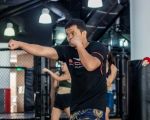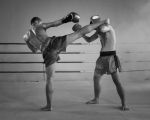How to Perform the Perfect Muay Thai Knee Strike
- 1. Understanding the Muay Thai Knee Strike
- 2. Preparing Your Body for the Knee Strike
- 3. Proper Body Positioning
- 4. Executing the Perfect Knee Strike
- 5. Common Mistakes to Avoid
- 6. Real-Life Example: Muay Thai Knee Strike in Action
- 7. Final Tips for Mastering the Muay Thai Knee Strike
1. Understanding the Muay Thai Knee Strike
The knee strike, also known as "Khao Chok," is one of the most powerful and versatile techniques in Muay Thai. It’s used in close-range fighting to damage your opponent’s torso or head, relying on both power and precision. Unlike a traditional punch or kick, the knee strike uses your entire body to generate force, with the primary movement originating from the hips and core.
The key to a perfect knee strike is integrating your body’s movements. It’s not just about raising your knee; it’s about the momentum and drive of your body that gives the strike its devastating effect. When performed properly, a Muay Thai knee strike can leave your opponent stunned and potentially vulnerable to further attacks.
2. Preparing Your Body for the Knee Strike
Before diving into the technique, it's essential to prepare your body for the power needed to deliver a perfect Muay Thai knee strike. Start by strengthening your core and legs, as these areas will be heavily involved in generating power. Exercises such as squats, leg raises, and core workouts will build the necessary strength.
Flexibility is also key for an effective knee strike. Stretching your hips and lower back will help you improve the range of motion and perform the knee strike fluidly. Regular training will increase both your endurance and the power behind each strike, ensuring that you can maintain proper form and energy throughout the fight.
3. Proper Body Positioning
Positioning your body correctly is crucial for executing a Muay Thai knee strike. The first step is establishing the right stance. Stand with your feet shoulder-width apart, with your knees slightly bent. Keep your guard up, and make sure you maintain a strong and balanced base.
When preparing to strike, make sure your body faces your opponent at a slight angle, allowing for maximum hip rotation and stability. As you bring your knee up, rotate your hip to create additional force. Your non-striking hand should stay in front of you, ready to defend or control your opponent’s movements, while your striking hand can be used to push or control their head or upper body, creating the perfect set-up for the strike.
4. Executing the Perfect Knee Strike
To execute the perfect knee strike, follow these steps:
- Step 1: With your body angled slightly, step forward with your lead foot. This action helps you close the distance between you and your opponent.
- Step 2: Lift your back knee upward, driving it forward toward the target. Ensure your hips rotate along with the knee to generate force from the core.
- Step 3: As your knee meets the target, ensure it’s aimed at a vulnerable spot on your opponent, such as the ribs, midsection, or head. Focus on the precision of the strike for maximum impact.
- Step 4: Upon contact, follow through by slightly pushing with your hands, maintaining your balance and stability, and being ready for further attacks.
Perfecting this sequence requires practice and control, so work on your form slowly at first, gradually increasing speed and intensity as your technique improves.
5. Common Mistakes to Avoid
While the Muay Thai knee strike is simple in concept, many beginners make common mistakes that can weaken the strike or even cause injury:
- Not Rotating the Hips: Failing to rotate your hips reduces the power behind the knee strike. Always ensure your hips drive forward with your knee to maximize impact.
- Not Using Enough Core Power: The core is the engine of the knee strike. Engaging your core muscles ensures you generate force through the knee, making it more effective.
- Overreaching: Striking without proper balance can leave you vulnerable to counter-attacks. Always maintain control of your body and strike with precision, not just power.
By avoiding these mistakes and focusing on proper technique, you can execute a Muay Thai knee strike with more power and efficiency.
6. Real-Life Example: Muay Thai Knee Strike in Action
A great example of the power of the Muay Thai knee strike can be seen in the famous fight between Thai fighter Buakaw Banchamek and his opponent in the K-1 World Max tournament. During this match, Buakaw displayed exceptional knee strikes, particularly when his opponent tried to close the distance. The knee strike not only caused damage but also showcased his incredible timing and precision, ending the fight in a dramatic finish.
This real-life example illustrates how a perfectly executed Muay Thai knee strike can be a game-changer in any fight, providing the opportunity for a quick knockout or significant advantage.
7. Final Tips for Mastering the Muay Thai Knee Strike
To master the Muay Thai knee strike, remember to:
- Practice Consistently: Like any technique, the key to mastering the knee strike is consistent practice. Work with pads or a heavy bag to get used to the movement.
- Work on Flexibility and Strength: Keep up with your flexibility and strength training to ensure fluidity and power when executing the knee strike.
- Use Visualization: Visualizing the knee strike in your mind can help improve timing and precision, making it easier to execute in high-pressure situations.
With these tips in mind, you’ll be well on your way to performing the perfect Muay Thai knee strike and taking your training to the next level.

































